情态动词汇总
14个情态动词及其用法

14个情态动词及其用法14个情态动词及其用法如下:1.can:表示能力,用于疑问句或否定句中表示惊异、怀疑、不相信等态度。
如:Can you speak English?你会说英语吗?2.could:表示过去的能力或可能性。
表示惊异、怀疑、不相信等态度时,可用could。
如:Could you have done this?你真的能做到这个吗?3.may:表示可能性。
用于请求、允许、祝愿等场合。
如:May I borr ow your book?我能借你的书吗?4.might:表示可能性,比may更委婉。
如:Might I have your attenti on,请大家注意。
5.must:表示肯定、确定,用于陈述事实或推测。
如:The game must be over,比赛应该结束了。
6.need:表示需要、必要性。
如:We need to finish this task today。
我们今天需要完成这个任务。
7.ought to:表示应该、应当,用于表示道义上的责任或推测。
如:Yo u ought to help him,你应当帮助他。
8.dare:表示勇气、敢。
如:Dare you jump off the bridge?你敢从桥上跳下去吗?9.shall:表示询问、承诺、威胁等。
如:Shall we start?我们开始吗?10.will:表示将来、意愿、决心等。
如:I will finish this work on ti me.我会按时完成这个工作。
11.had better:表示建议、警告。
如:You had better hurry,你最好快点。
12.have to:表示被迫、必须。
如:I have to go to work,我必须去上班。
ed to:表示过去经常发生的动作或状态,也可表示习惯或倾向。
如:He used to smoke,他过去经常抽烟。
14.shouldn't:表示不应该,用于否定句中表示建议、批评等。
情态动词有一定的意义汇总

The classroom needs cleaning.
可兼做行为动词的情态动词:need 、 dare 1.作为情态动词用,常用在否定句和疑问句中。 Dare (need) +S +V S + daren’t (needn’t) +V I daren’t walk through the forest at night. Dare you walk through the forest at night? You needn’t return the book now. Need he go yesterday?
句型 时态 动词 情态动词dare 实义动词 dare 肯定句 现在时 dare do dare/dares to do 过去时 dare do dared to do 否定句 现在时 daren’t/dare not do do/does not dare (to) do 过去时 dared not do did not dare (to) do 疑问句 现在时Dare he do? Do you/Does he dare (to) do? 过去时 Dared he do? Did he dare (to) do
will/would
Will /Would you do…? 表请求,表意志,愿望,决心
If you will help me with my English, I will be very happy. I promised that I would do my best.
would表过去反复发生得动作或某种倾向“总是,总要” used to表过去常常(现在已没有这种习惯)“过去常常” used to 可于状态动词连用 would不可以 eg. He used to be a quiet boy. ( √ ) He would be a quiet boy. ( × )
情态动词的基本用法归纳
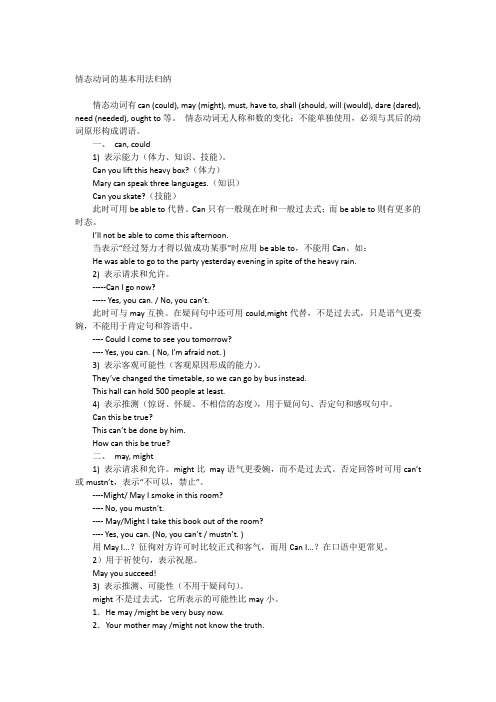
情态动词的基本用法归纳情态动词有can (could), may (might), must, have to, shall (should, will (would), dare (dared), need (needed), ought to等。
情态动词无人称和数的变化;不能单独使用,必须与其后的动词原形构成谓语。
一、can, could1) 表示能力(体力、知识、技能)。
Can you lift this heavy box?(体力)Mary can speak three languages.(知识)Can you skate?(技能)此时可用be able to代替。
Can只有一般现在时和一般过去式;而be able to则有更多的时态。
I’ll not be able to come this afternoon.当表示“经过努力才得以做成功某事”时应用be able to,不能用Can。
如:He was able to go to the party yesterday evening in spite of the heavy rain.2) 表示请求和允许。
-----Can I go now?----- Yes, you can. / No, you can’t.此时可与may互换。
在疑问句中还可用could,might代替,不是过去式,只是语气更委婉,不能用于肯定句和答语中。
---- Could I come to see you tomorrow?---- Yes, you can. ( No, I’m afraid not. )3) 表示客观可能性(客观原因形成的能力)。
T hey’ve changed the timetable, so we can go by bus instead.This hall can hold 500 people at least.4) 表示推测(惊讶、怀疑、不相信的态度),用于疑问句、否定句和感叹句中。
情态动词归类大全

情态动词一:情态动词的用法:常用的情态动词有can,may,must,need,should, had better.1. can 的用法:①表示能力“能,会” eg: He can speak a little Japanese.他会说一点日语。
②表示请求或许可“可以” eg: Can I help you? 要我帮忙吗?③表示猜测“可能” eg: Where can she go now? 她可能到哪里去了呢?2.may 的用法:①表示请求或允许“可以”“准许” eg: May I go home,please?请问我可以回家吗?②表示可能性“可能”、也许” eg: I think it may rain this afternoon. 我想今天下午可能下雨。
注:might为may的过去式,但也可以代替may,语气较为婉转客气或更加不肯定。
eg: ① He might not come today.今天他也许不来了。
(语气不肯定)②You might also get a headache when you work too hard,当你工作太努力时,你也可能患头痛3. must的用法:①表示义务、必要或命令“必须、应该” eg: You must come early tomorrow.你明天得早来。
②表示推测时“肯定,一定” eg: They must be at home.The light is on 他们肯定在家,灯亮着呢.③ must not 禁止,不许 eg: You must not tell lies. 你不许撒谎。
注意:①must开头的疑问句,其否定回答通常用 don't have to 或needn't 。
而不用mustn'teg: ---Must I finish my homework first? 我必须先完成作业吗?---No, you don't have to/ needn't. 不,你不必。
人教版初二英语知识点汇总

人教版初二英语知识点汇总Unit 1 仪式与礼仪 (Ceremonies and Etiquette)语法1.情态动词 (Modal Verbs)–can/could: 表示能力–may/might: 表示允许、可能–must: 表示必须、肯定–should/ought to: 表示应该、建议–will/would: 表示意愿、习惯、预测2.疑问词 (Question Words)–what, who, whom, whose, which, when, where, why, how–它们用来引导疑问句和作为一些复合词语的成分。
词汇1.仪式 (Ceremonies)–wedding: 婚礼–graduation: 毕业典礼–birthday: 生日–funeral: 葬礼2.礼仪 (Etiquette)–manners: 礼貌、行为规范–polite: 礼貌的–impolite: 不礼貌的–greeting: 问候、招呼3.词根词缀–-ful: 充满…的–-less: 无…的阅读与写作1.借助上下文推测词语含义2.围绕着仪式和礼仪,谈论交际中的礼貌、得失、情感等话题3.书写礼节性文章,如:感谢信、祝贺信等Unit 2 海底世界 (Underwater World)语法1.一般过去时 (Simple Past Tense)–表示过去发生的动作或情况2.过去进行时 (Past Continuous Tense)–表示过去某个时刻正在发生的动作或情况–表示过去某个时刻正在进行的一段时间的动作或情况3.比较级与最高级 (Comparative and Superlative)–比较级:比较两者之间的大小、程度等–最高级:在同一范围内比较三者或三者以上之间的大小、程度等词汇1.海洋生物 (Marine Life)–fish: 鱼类–shark: 鲨鱼–whale: 鲸鱼–dolphin: 海豚–octopus: 章鱼2.海底景观 (Underwater Scenery)–coral: 珊瑚–reef: 礁–seaweed: 海藻–sand: 沙子–rock: 岩石3.词根词缀–-ful: 充满…的–-less: 无…的阅读与写作1.理解科普类文本,如海洋生物、海底景观等2.以海底生物或海底景观为题材写作3.讨论环保问题,提高保护海洋的意识Unit 3 歷史人物 (Historical Figures)语法1.现在完成时 (Present Perfect Tense)–表示过去发生的动作或情况对现在产生的影响或状态2.倍数表达 (Expressions of Multiples)–three times, ten times, half, twice, etc.词汇1.歷史人物 (Historical Figures)–Lu Xun: 鲁迅–Marie Curie: 玛丽·居里–Leonardo da Vinci: 列奥纳多·达·芬奇–William Shakespeare: 威廉·莎士比亚–Susan B. Anthony: 苏珊·B·安东尼2.近义词 (Synonyms)–bad: poor, awful, terrible, etc.–good: great, excellent, wonderful, etc.阅读与写作1.阅读并理解与历史人物有关的文章2.进一步理解英语写作中的语法知识,并进行应用3.了解不同历史人物的生平、成就、思想等方面,并进行分析和讨论Unit 4 电影与明星 (Movies and Stars)语法1.一般现在时 (Simple Present Tense)–表示现在的习惯、状态、和真理等2.介词 (Prepositions)–表示方位、时间、原因等词汇1.电影 (Movies)–action movie: 动作片–comedy: 喜剧–drama: 剧情片–romance: 爱情片2.明星 (Stars)–Tom Hanks: 汤姆·汉克斯–Angelina Jolie: 安吉丽娜·朱莉–Jackie Chan: 成龙–Zhang Ziyi: 章子怡3.词根词缀–-ful: 充满…的–-less: 无…的阅读与写作1.阅读关于电影和明星的电影介绍及其他相关文章2.提高英语写作及口语表达能力,表达个人对电影和明星的态度与看法3.了解不同国家的电影和明星,扩大视野,请认识其他文化Unit 5 旅游与文化 (Travel and Culture)语法1.疑问句与回答 (Questions and Answers)–一般疑问句:句末加上问号即可,不需要改变动词形式–特殊疑问句:疑问词+一般疑问句2.时间 (Time)–日期:year, month, day–时间:hour, minute, second词汇1.旅游 (Travel)–destination: 目的地–attraction: 景点–tour: 旅游–ticket: 票–guide: 导游2.文化 (Culture)–festival: 节日–cuisine: 美食–customs: 国情习俗–art: 艺术3.词根词缀–-ful: 充满…的–-less: 无…的阅读与写作1.理解旅游信息、文化类文章,并复述文章中的重点内容2.对旅游信息、文化类话题进行表达,包括自我介绍和讲解等3.完成书面作业,包括旅游计划、议论文等,以提高英语写作能力Unit 6 健康与生活 (Health and Life)语法1.祈使句 (Imperative Sentences)–用来表示请求、命令、建议、警告等2.祈使句的否定形式 (Negative Imperatives)–在谓语动词前面加don’t 或 do not词汇1.健康 (Health)–diet: 饮食–exercise: 运动–sleep: 睡眠–stress: 压力2.生活 (Life)–hobby: 爱好–music: 音乐–movie: 电影–game: 游戏3.词根词缀–-ful: 充满…的–-less: 无…的阅读与写作1.理解有关健康和生活的文本,并提高表达和理解能力2.通过日常生活中的例子掌握祈使句的用法和技巧3.书写健康、生活类文章,以提高英语写作水平。
情态动词need的用法汇总
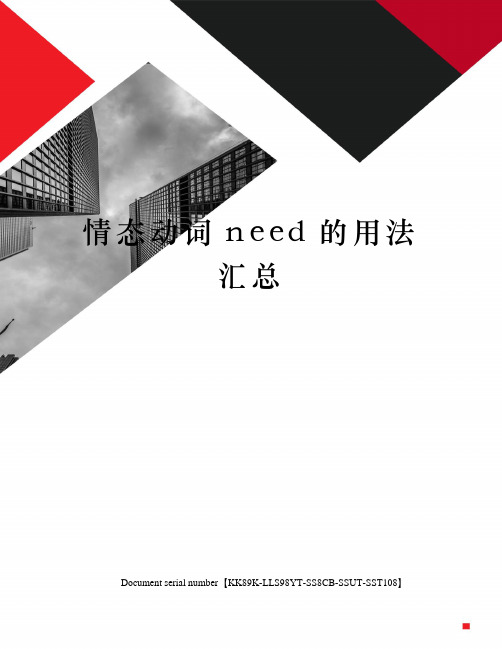
情态动词n e e d的用法汇总Document serial number【KK89K-LLS98YT-SS8CB-SSUT-SST108】need”的用法及其区别“need”既可以作,也可以作,但是它们的用法不同。
作为的“need”的用法与其他情态动词“can”,“may”,“must”的用法基本相同:在词组中总是位居第一,没有非限定形式,即没有、-ing分词或-ed 分词等形式;现在时没有词形变化;情态动词之间是相互排斥的,即在一个词组中只能有一个情态动词。
下面是“need”作为情态动词的用法:一、need表示“需要”或“必须”,通常用于和疑问句。
例如:1.You needn't do it again.你不需要再做了。
2.He needn't worry about it.这件事他无需担心。
3.Need he do this homework first他需要先做这些作业吗4.Need they fill in the form他们需要填表吗二、在中,可以用need的否定形式+完成体。
例如:1.We needn't have worried.其实我们不必要慌。
2.You needn't have mentioned it.你本来不必提起这件事。
3.You needn't have said that when he asked.当他问的时候,你其实不必要说。
三、needn't后的间或也能用或。
例如:1.He needn't be standing in the rain.他不必要站。
2.We needn't be waiting in this place.我们不必要在这儿等。
3.The hedges needn't be trimmed thisweek.本周树蓠不必要整修。
“need”作为时,通常用法是:人+need +to do物+need +doing物+need +to be done另外,“need”后还可以直接跟名词。
高考英语语法情态动词考点汇总

二、need/dare 改错题:
1. A child who is under 10 years old needn’t a ticket. doesn’t need 2. I dare not to go out alone at night. I dare not go out alone at night. I don’t dare to go out alone at night. 3. Dared you to ask him the question yesterday? Dared you ask him the question yesterday?
used to 曾经,强调“今昔不同”。
He used to be a handsome boy.
This used to be a small city.
had better=had best “最好” had better (best) not do sth. 最好不做
You had better stay at home. You’d better not wake me up.
2. 表“允许”,意为“可以”。例如: Can I have another cup of tea? You can’t smoke here. 在疑问句中可以用could 表示更加委婉 的语气, 但回答时需用can。例如: -Could I ask you something, if you are not too busy? -Yes, you can.
1.表“义务”,意为“必须”
---Must we hand in our homework before supper? ---Yes, you must. /No, you needn’t/ don’t have to.
高中英语考点汇总:情态动词和虚拟语气

考向1 情态动词一、can, could 与be able to1. 表示能力(体力、知识、技能)。
☞Can you lift this heavy box?(体力)☞Mary can speak three languages.(知识)☞Can you skate?(技能)此时可用be able to代替。
can只有一般现在时和一般过去式;而be able to则有更多的时态。
☞I’ll not be able to come this afternoon.当表示“经过努力才得以做成功某事”时应用be able to,不能用can。
如:☞He was able to go to the party yesterday evening in spite of the heavy rain.2. 表示请求和允许。
☞——Can I go now?——Yes, you can. / No, you can’t. 此时可与may互换。
在疑问句中还可用could, might代替,不是过去式,只是语气更委婉,不能用于肯定句和答语中。
☞——Could I come to see you tomorrow?—— Yes, you can. ( No, I’m afraid not. )3. 表示客观可能性(客观原因形成的能力)。
☞They’ve changed the timetable, so we can go by bus instead. This hall can hold 500 people at least.4. 表示推测(惊讶、怀疑、不相信的态度),用于疑问句、否定句和感叹句中。
☞Can this be true?☞This can’t be done by him. How can this be true?1.In today’s information age, the loss of data _________ cause serious problems for a company.A. needB. shouldC. canD. must【参考答案】C【答案解析】考查情态动词。
德语语法学习:德语6个情态动词用法汇总
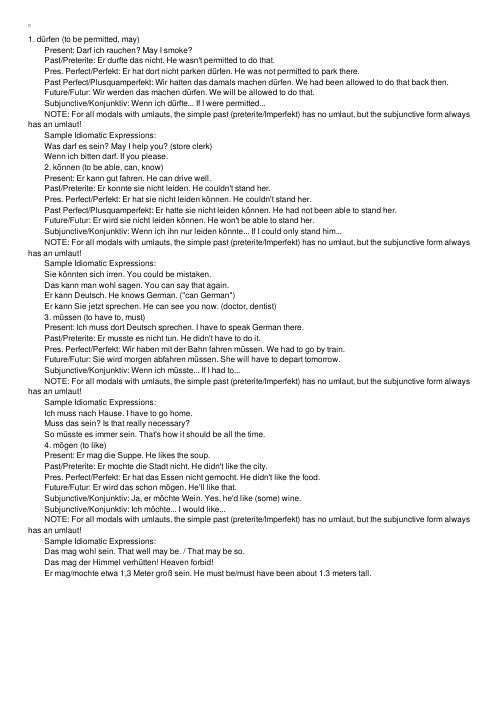
1. dürfen (to be permitted, may) Present: Darf ich rauchen? May I smoke? Past/Preterite: Er durfte das nicht. He wasn't permitted to do that. Pres. Perfect/Perfekt: Er hat dort nicht parken dürfen. He was not permitted to park there. Past Perfect/Plusquamperfekt: Wir hatten das damals machen dürfen. We had been allowed to do that back then. Future/Futur: Wir werden das machen dürfen. We will be allowed to do that. Subjunctive/Konjunktiv: Wenn ich dürfte... If I were permitted... NOTE: For all modals with umlauts, the simple past (preterite/Imperfekt) has no umlaut, but the subjunctive form always has an umlaut! Sample Idiomatic Expressions: Was darf es sein? May I help you? (store clerk) Wenn ich bitten darf. If you please. 2. können (to be able, can, know) Present: Er kann gut fahren. He can drive well. Past/Preterite: Er konnte sie nicht leiden. He couldn't stand her. Pres. Perfect/Perfekt: Er hat sie nicht leiden können. He couldn't stand her. Past Perfect/Plusquamperfekt: Er hatte sie nicht leiden können. He had not been able to stand her. Future/Futur: Er wird sie nicht leiden können. He won't be able to stand her. Subjunctive/Konjunktiv: Wenn ich ihn nur leiden könnte... If I could only stand him... NOTE: For all modals with umlauts, the simple past (preterite/Imperfekt) has no umlaut, but the subjunctive form always has an umlaut! Sample Idiomatic Expressions: Sie könnten sich irren. You could be mistaken. Das kann man wohl sagen. You can say that again. Er kann Deutsch. He knows German. ("can German") Er kann Sie jetzt sprechen. He can see you now. (doctor, dentist) 3. müssen (to have to, must) Present: Ich muss dort Deutsch sprechen. I have to speak German there. Past/Preterite: Er musste es nicht tun. He didn't have to do it. Pres. Perfect/Perfekt: Wir haben mit der Bahn fahren müssen. We had to go by train. Future/Futur: Sie wird morgen abfahren müssen. She will have to depart tomorrow. Subjunctive/Konjunktiv: Wenn ich müsste... If I had to... NOTE: For all modals with umlauts, the simple past (preterite/Imperfekt) has no umlaut, but the subjunctive form always has an umlaut! Sample Idiomatic Expressions: Ich muss nach Hause. I have to go home. Muss das sein? Is that really necessary? So müsste es immer sein. That's how it should be all the time. 4. mögen (to like) Present: Er mag die Suppe. He likes the soup. Past/Preterite: Er mochte die Stadt nicht. He didn't like the city. Pres. Perfect/Perfekt: Er hat das Essen nicht gemocht. He didn't like the food. Future/Futur: Er wird das schon mögen. He'll like that. Subjunctive/Konjunktiv: Ja, er möchte Wein. Yes, he'd like (some) wine. Subjunctive/Konjunktiv: Ich möchte... I would like... NOTE: For all modals with umlauts, the simple past (preterite/Imperfekt) has no umlaut, but the subjunctive form always has an umlaut! Sample Idiomatic Expressions: Das mag wohl sein. That well may be. / That may be so. Das mag der Himmel verhütten! Heaven forbid! Er mag/mochte etwa 1,3 Meter groß sein. He must be/must have been about 1.3 meters tall.。
情态动词need的用法汇总
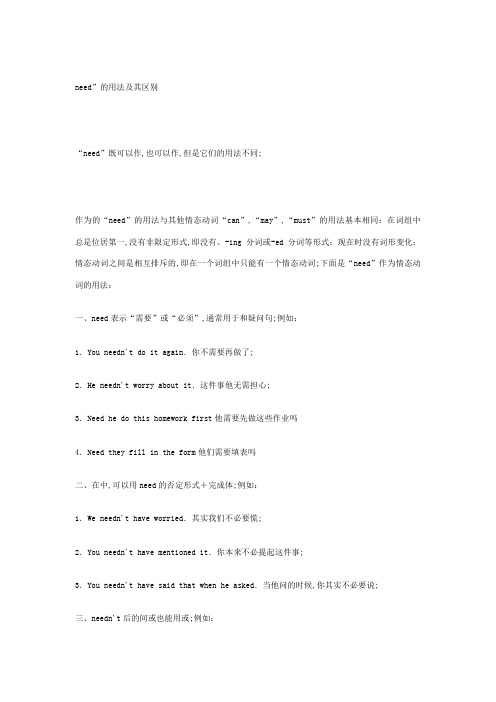
need”的用法及其区别“need”既可以作,也可以作,但是它们的用法不同;作为的“need”的用法与其他情态动词“can”,“may”,“must”的用法基本相同:在词组中总是位居第一,没有非限定形式,即没有、-ing分词或-ed分词等形式;现在时没有词形变化;情态动词之间是相互排斥的,即在一个词组中只能有一个情态动词;下面是“need”作为情态动词的用法:一、need表示“需要”或“必须”,通常用于和疑问句;例如:1.You needn't do it again.你不需要再做了;2.He needn't worry about it.这件事他无需担心;3.Need he do this homework first他需要先做这些作业吗4.Need they fill in the form他们需要填表吗二、在中,可以用need的否定形式+完成体;例如:1.We needn't have worried.其实我们不必要慌;2.You needn't have mentioned it.你本来不必提起这件事;3.You needn't have said that when he asked.当他问的时候,你其实不必要说;三、needn't后的间或也能用或;例如:1.He needn't be standing in the rain.他不必要站;2.We needn't be waiting in this place.我们不必要在这儿等;3.The hedges needn't be trimmed thisweek.本周树蓠不必要整修;“need”作为时,通常用法是:人+need +to do物+need +doing物+need +to be done另外,“need”后还可以直接跟名词;请看下面的例子:1.We need to collect the parcel before we leave for England.去英国之前,我们需要收拾好行李;2.We need to tell him the truth.我们需要告诉他真相;3.My car needs repairing.我的汽车需要修理;4.The flowers need watering.这些花需要浇水;5.His leather shoes needs to be mended.他的皮鞋需要修补;6.Her room needs cleaning.她的房间需要打扫;7.It is aquestion that needs very careful consideraton.这是一个需要慎重考虑的问题; 8.I need a watch.我需要一块手表;一、need 作情态动词:二、1不能单独作谓语, 只能和其他动词原形构成谓语;三、2在句中放在谓语动词之前, 谓语动词前若有助动词,则在助动词之前;疑问句中, 则在主语之前;四、3多用在否定句或疑问句中;五、4无人称和数的变化;六、5否定式构成是在后面加 "not";七、Need I attend the meeting tomorrow八、我需要明天参加会议吗九、You need not hand in the paper this week.十、这一周你不必交论文;十一、You didn't need to tell him the news; it just made him sad.十二、你无需告诉他这一消息, 那只会使他悲哀;十三、二、need作实义动词时: need 就像其他动词一样,有第三人称,单复数, 后面加带to 的动词等特性;十四、I need a bike to go to school.十五、我上学需要一辆自行车;十六、Do you need a dictionary 你需要词典吗十七、She needs a necklace.她需要一条项链;十八、needn't + have + 过去分词表示“过去做了没必要做的事情; ”十九、You needn't have taken it seriously.二十、这件事情你不必太认真;情态动词need的用法作为情态动词,need一般只用于否定句和疑问句中;You needn’t try to expla in. 你不需要解释;She needn’t come tomorrow. 她明天不必来;Need we stay here this evening 今晚我们需要在这儿住下来吗Need 作为实意动词比作为情态动词常用的多;实意动词need 可用在所有句型中;She needs to come tomorrow. 明天她需要来;You don’t need any help from others. 你不需要别人的任何帮助;He doesn’t need to borrow money. 他不需要借钱;Do they need this 他们需要这个吗Plants need sun light in order to grow. 植物需要阳光才能生长;You don’t need to work so hard. 你不需要这么样地努力工作;Your shoes need cleaning/to be cleaned. 你的鞋子需要清洁;The job doesn’t need much attention or time. 这份工作很省心省事;What he needs is a good beating. He needs a good beating. 需要好好揍他一顿need的用法■作情态动词:通常用在疑问句、否定句中,或与条件句、whether, hardly, nobody等连用;如:Need he go so soon他这么快就要走吗He needn’t go. 他不必走;If she wants anything, she need only ask. 她想要什麽, 只需说一声就行;He wondered whether they need go there. 他不知道他们是否需要去那里;Nobody need be afraid of catching the disease. 谁都不用害怕能得这种病.注意:1. 因 need 不能用于肯定句,因此肯定回答要用 must;如:—Need I stay here any longer 我需要在这呆下去吗—No, you needn’t. 不需要;—Yes, you must. 是的,需要呆下去;2. need have done 的否定式或疑问式,表示“本来不必做某事,但事实上却做了”;如:Sh e needn’t have come in person a call would have been enough. 她本不必亲自来——打个电话来就足可以了;Need you have paid so much你当时真须要付那麽多钱吗■作行为动词:可用于疑问句、否定句和肯定句;如:Does he need to go so soon他这么快就要走吗He doesn’t need to go. 他不需要走;They need our help. 他们需要我们帮助;注:作行为动词的need后可接动名词的主动式表示被动含义;如:The garden needs watering=to be watered . 花园该浇水了;■还可作名词:表示“需要, 必需, 必需品”等;如:The doctor told me I was in need of a good rest. 医生说我需要好好休息;There is no need for you to go. 你没有必要去;Our needs are modest. 我们的必需品是谦虚1. 基本用法特点need可用实意动词和情态动词,用作情态动词时,意思是“有必要”或“需要”,其后接动词原形,通常只用于否定句或疑问句以及if或whether之后,一般不用于肯定句;如:You needn‘t worry. 你不必担心;Why need you go today 为什么你需要今天走He wondered whether they need send a deposit. 他不知道他们是否得交定金;「注」1 由于用作情态动词的need通常不用于肯定句,所以对于以need开头的疑问句的否定回答可用nee dn‘t,但是肯定回答却不能用Yes, you need之类的,应根据具体情况改用其他表达;如:"Need he stay here" "Yes, he must." “他有必要留在这儿吗”“是的,必须留在这儿;”2 need有时用于含有only, all 等表限制意义的肯定句中;如:This is the only form you need fill in. 你要填的只有这一张表;All you need do is to take a taxi from the airport. 你只需从机场打个的即可;2. 后接动词完成式的用法若要谈论过去情况,应在其后接动词完成式;如:You needn‘t have come in person. 你当时不必亲自来的;Need you have paid so much 你当时真需付那么多钱吗「注」1 在宾语从句中可直接用need表示过去也可用didn‘t have to;如:He said he need not didn‘t have to hurry. 他说他不必匆忙;2 注意对“need+have+过去分词”结构疑问式的回答;如:"Need he have come so early" "Yes, he had to." / "No, he needn‘t have."“他来那么早有必要吗”“有必要,他必须来那么早;”/“不,他本来没有必要来那么早的;”3. 后接动词进行式的用法有时后接进行式表示动作正在进行;如:We needn‘t be standing here in the rain. 我们没有必要站在这里被雨淋;4. needn‘t have done与didn’t need to do前者主要表示某事已经做了,但后来觉得没必要去做,因此常含有责备或遗憾之意;后者则不具体表明某事是否做了即可能做了也可能没有做,此用法中的need为实意动词;如:I got up early, but I needn‘t have done so, because I had no work to do that morning. 我起床起得很早,但我本来不必起那么早的,因为我那天早上没什么事做;I didn‘t need to get up early this morning, so I stayed in be d until 9 am. 今天早上我不必早起,所以我一直睡到上午九点钟才起床;若没有特定的上下文,有时可能有歧义;如:I didn‘t need to go the office yesterday.1 我昨天无需去那儿;所以没去=I didn‘t have to go there yesterday.2 我昨天本来不必去那儿的;但我却去了=I needn‘t have gone there yesterday.need和dare的用法要点need和dare可用作实义动词和情态动词,用作实义动词时,后接动词要用不定式,有人称和数的变化,可用肯定句、否定句和疑问句;用作情态动词时,主要用于否定句和疑问句中,没有人称和数的变化,后接动词要用动词原形;如:You need not pay—it is free. 你不必付钱,这是免费的;We need to have lots of patience. 我们需要有很大的耐心;Who would dare to tell him 谁会敢告诉他He dared not go there at night. 晚上他不敢到那里去;How dare you ask me such a question 你怎么敢问我这样的问题注:need 表示“需要”,其后可接动名词,且要用主动形式表示被动意义;如:The room needs cleaning. 这房间需要打扫了;need表示“需要”或“必须”,通常用于否定句,疑问句,条件句;例如:1.You needn't do it again.你不需要重复做了;2.He needn't worry about it.这件事他无需担心;3.Need he do this homework first他需要先做这些作业吗4.Need they fill in the form他们需要填表吗二、在否定句中,可以用need的否定形式+不定式完成体;例如:1.We needn't have worried.其实我们不必担心;2.You needn't have mentioned it.你本来不必提起这件事;3.You needn't have said that when he asked.当他问的时候,你其实不必要说;三、needn't后的不定式间或也能用进行式或被动语态;例如:1.He needn't be standing in the rain.他不必要站在雨中;2.We needn't be waiting in this place.我们不必要在这儿等;3.The hedges needn't be trimmed this week.本周树蓠不必要整修;四、其一般疑问句的答语,肯定用must,否定用needn't;Need I go with her 我需要和她一起去吗Yes,you must. 是的,你需要去;No,you needn't. 不,你不必去;作实义动词主+need +to do主+need +doing =sth+need +to be done都是实义动词,注意其否定为主+don‘t/doesn't+need +to be done或主+needn’t +be done 例如:The room needs cleaning = The room needs to be cleaned. 房间需要打扫了;另外,“need”作实义动词时后还可以直接跟名词;请看下面的例子:It is a question that needs very careful consideration.这是一个需要慎重考虑的问题很简单的方法区别情态动词与实义动词:当need为情态动词时,意思是“必要”,否定为"needn't",后面大多接动词原形,表示动作;当need为实义动词时,意思是“需要”,否定为"don't need",后面大多跟名词;词汇搭配~+名词need clothes 需要衣服need education 需要受教育need food 需要食物need help 需要帮助need money 需要钱need rice 需要大米need water 需要水~+副词need critically 极为重要地需要need desperately 不顾一切地需要need directly 直接地需要need economically 经济上地需要need genuinely 真正地需要need horribly 惊人地需要need imperatively 紧急地需要need sorely 非常需要need spiritually 精神上需要need urgently 强烈地需要~+介词need for 为…而需要need in 在…需要词语辨析need,want这组词都有“需要,要求”的意思;其区别是:need表示因缺少而需要某物或需要做某事,尤其强调这种需要的迫切性; want表示从一般需要的意向到强烈、迫切的要求以及各种程度不同的愿望;need作情态动词的用法:need用作情态动词时表“必须必要”的意思,后直接跟动词原型,且need无人称、数的变化第三人称单数不加s,也没有非谓语形式不定式、分词;注意:need用作情态动词时常用于否定句和疑问句中;例:Need he bring his laptop tomorrow 明天他必须带他的笔记本过来吗Come on, you needn't worry about it becuse it's not your fault. 行啦,你不必担心的因为那不是你的错;She needn't have arrived so early, need she 她本不必到得这么早,不是吗注意:must引导的一般疑问句的否定回答必须使用needn't;例如:-Must I leave 我必须离开吗-No, you needn't. 不,你不必离开;二、need作实意动词的用法:1、need + something 需要某物例:I need some fruits to eat. 我需要些水果来吃;2、need to do something 需要做某事例:You don't need to have the bike repaired right away. 你不必马上去修车;3、need doing = need to be done 需要……例:The room needs cleaning = The room needs to be cleaned. 房间需要打扫了;4、need somebody to do something 需要某人做某事例:I need someone to help me out of this problem. 我需要找人来帮助我解决这个问题;三、need作名词的用法:need用作名词时,既可以是可数名词,也可以是不可数名词;主要常用句型如下:1、There's no need to do something 没必要做某事例:There's no need to cover such a long distance. 没必要走那么远的距离;There's no need for me to break the window because I have the key. 我没必要打破窗户因为我有钥匙;No need to run since we're not pressed for time. 不必跑啦,我们又不赶时间;也可以单独使用:There's no need. 意思是“没有必要”;2、in great need of 非常需要例:The rescue team is in great need of medicine. 救援小组非常需要药品;3、if need be 如果需要的话例:If need be, I'm going to do you a favor. 如果需要的话我会帮你的;四、关于need的一些短语、俚语用法;1、A friend in need is a friend indeed. 患难之交才是真朋友;could+have+过去分词”的10种用法一、表示主观猜测即对已经发生动作或已经存在的状态作出主观上的猜测,通常可译为“可能已经”,有时需根据具体语境来;如:We could not have heard them because of the noise from the river. 由于有河水声我们不能听见他们的话;Tom could have taken the money; he was here alone yesterday. 有可能是汤姆把钱拿走了,昨天他单独一个人在这里呆过;We knew he couldn’t have paid for it, because he had no money. 我们知道不可能是他付了这笔钱,因为他没钱;说明该用法也可将could换成can,但这只限于否定句和疑问句,因为can表推测时不用于肯定句而could可以用于肯定句;如:Can he have left already 他会已经离开了吗They can’t have gone out because the light’s on. 他们不可能出去了,因为灯还亮着;二、表示未曾实现的能力即表示过去本来有能力可以做某事的,但实际上没有那样去做,通常译为“本来可以”“本来能够”等;如:The worst of it is that I could have prevented the accident. 最糟糕的是我本来可以防止这次事故的;We could have got in for nothing—nobody was collecting tickets. 我们本可以不买票就进去——根本没人收票;I could have passed my examination easily but I made too many stupid mistakes. 我本可以轻易通过考试,但我犯了太多不该犯的错误;有时用于反语;如:You’ve broken my pen—thanks for nothing, I could have done that for myself. 你把我的笔给弄坏了——你得了吧,就那我自己也会弄;三、表示未曾实现的可能性即表示过去本来可能发生的情况,而实际上没有发生,通常译为“本来可以”“本来可能”等;如:She could have been seriously injured. 她本来可能伤得很重的;It’s difficult enough, but it could have been worse. 这事情够困难的了,本来可能会更糟呢;有时也可根据语境译为“好在没有”“差点”,尤其是当谈论的是“不好”的情况时;如:She felt miserable. She could have cried. 她感到很痛苦,她差点哭了;That was a bad place to go skiing—you could have broken your leg. 那不是一个滑雪的好地方,好在你没有把腿给摔断;Why did you throw the bottle out of the window Somebody could have been hurt. 你为什么把瓶子扔出窗外呢好在没有砸伤人;They were lucky—they could have been killed. 他们很幸运,差点被打死了;Did you see him fall He could have killed himself. 你看见他摔倒了吗他差点摔死了;有时需要有比较灵活的:When I discovered I’d come for the appointment on the wrong day, I could have kicked myself. 我来赴约发现把日期弄错了,感到非常懊恼;四、表示未曾实现的想法即表示过去本来有做某事的打算或意图,但实际上没有实现,通常译为“本来可以”;如:I could have lent you the money. Why didn't you ask me 我本来可以借这笔钱给你的;你为什么不向我提出I could have given you some hints, but I suppose you thought yourself too grand. 我本可以给你点提示的,但是我认为你太自负了;五、表示未曾实现的选择即表示过去本来可以有机会选择做某事,但实际上没有那样做,通常译为“本来可以”;如:Her husband could have told her, but he did not choose to. 她丈夫本来可以告诉她的,但他不想这样做;I could have lent you the money. Why didn’t you ask me 我本来可以借这笔钱给你的,你为什么不向我提出y ou needn’t have typed it twice. You could have used a carbon. 你没必要打两遍的,你当时本可以用复写纸打;You needn’t have walked up; you co uld have taken the lift. 你没必要走着上去,你本来可以乘电梯的;六、表示批评或责备即表示过去本来有责任或义务应该做某事,但实际上却没有做成,含有批评和责备的意味,通常译为“本来应该”“本来可以”等;如:You could have started a little earlier. 你本可早点动身的;You could have helped me—why did you just sit and watch你本来可以帮我一把嘛——为什么你只是坐在那儿观望呢I am disappointed that you didn’t tell me. You could have told me. 你没告诉我,我感到很失望,你本来应该告诉我的;You could have let me know you were going out tonight. 你本来可以告诉我你今晚是要出去的七、表示达到极限表示即使人们尽力而为去做某事,但还是未能做成,通常用于否定句;如:I couldn’t have won, so I didn’t go in for the race. 反正我也赢不了,所以我就没有参加赛跑;I couldn’t have enjoyed myself more—it was a perfect day. 我玩得没法再痛快了——这一天简直痛快极了;八、表示惊讶表示对所发生的情况感到惊奇,含有“竟然”的意味;如:It seems inconceivable that the accident could have happened so quickly. 这一事故发生得这么快,简直不可思议;Well, I’m blowed I should neve r have thought you could have done it. 真想不到我从未想到居然办得到;九、用于虚拟语气在虚拟条件句中,当谈论过去的情况时,其句型通常是:主句用“could / would / should /might+have+过去分词”,从句用过去完成时;如:If I hadn’t warned you, you could have been killed. 我如不是警告了你,你就可能丧命了; If you had come sooner, you could have helped us. 你如早来一点,就会帮上我们了;If he had known the facts, he could have told us what to do. 如果他了解事实,他是可能告诉我们怎样做的;If anybody had asked me, I could have told them what happened. 如果有谁问过我,我可以告诉他们发生了什么情况;十、用于某些口语惯用表达可用于某些口语惯用表达,如用于I could have sworn…,其意是“我可以发誓”“我千真万确”;如:I could have sworn I’d paid that bill. 我可以发誓我付过账;I could have sworn I heard a knock at the door. 我千真万确听到了敲门声;l情态动词+have+done是重点和难点之一,现将其用法总结归纳如下:一、“must+have+done”表示对过去事情的肯定推测,译成“一定做过某事”,该结构只用于肯定句;1. It must have rained last night, for the ground is wet. 昨晚一定下雨了,因为地面还是湿的;2. You must have been mad to speak to the servant. 你和仆人说话,一定是发疯了;二、“can't+have+done”表示对过去事情的否定推测,译成“不可能做过某事”;1. Mr. Smith can't have gone to Beijing, for I saw him in the library just now. 史密斯先生不可能去北京了,我刚才还在图书馆见过他;2. Mary can't have stolen your money. She has gone home. 玛丽不可能偷你的钱,她回家去了;三、“can+have+done”表示对过去行为的怀疑,用于疑问句,译成“可能做过……吗”;1. There is no light in the room. Can they have gone out 屋里没有灯,他们可能出去了吗2. There is nowhere to find them. Where can they have gone 到处找不到他们,他们可能到什么地方去呢四、“could+have+done”是虚拟语气,表示对过去事情的假设,意思是本来能够做某事而没有做;He could have passed the exam, but he was too careless. 本来他能够通过考试,但是他太粗心;五、“may+have+done”表示对发生过的事情的推测,意思是“可能已经”或“也许已经”,用于肯定句中;—What has happened to George—I don't know. He may have got lost.—乔治发生了什么事——我不知道,他可能迷路了;六、“might+have+done”表示对过去事情的推测,might与may意思相同,但可能性更小;多用于虚拟语气结构中;1. He might have given you more help, even though he was busy. MET90 他或许会多给你一些帮助,即使他很忙;2. She might have achieved greater progress, if you had given her more chances. 如果你多给她点机会,她可能已经取得更大的成绩;七、“would+have+done”虚拟语气,表示对过去事情的假设,意思是“本来会做”;1. I would have told you all about the boy's story, but you didn't ask me. 我本来会告诉你这个小男孩的故事,但是你没有问我;2. Without your help, I wouldn't have achieved so much. 没有你的帮助,我是不会取得如此大的成绩;八、“should+have+done”意思是“本来应该做某事,而实际没做;” “shouldn't+have+done”表示本来不应该做某事,而实际做了;含有指责对方或自责的含意;1. Tom, you are too lazy. The work should have been finished yesterday. 汤姆,你太懒惰了,这项工作本来应该昨天就做完的;2. Look, Tom is crying. I shouldn't have been so harsh on him. 看,汤姆哭了,我本来不应该对他如此严厉;3 you should have told me 你早就应该告诉我九、“ought to+have+done”表示过去应该做而实际并没有做,译成“理应做……”,往往表示遗憾;与“should+have+done”用法基本一样;I ought to have gone home last Sunday. 我理应上星期日回家;You ought not to have given him more help. 你不应该帮助他那么多;十、“need+have+done”表示本来需要做某事而没有做;“needn't+have+done”则表示“本来不需要做某事而做了”;I needn't have bought so much wine—only five people came. 我本来没有必要买这么多酒,只来了五个人;He need have hurried to the station. In that case, be wouldn't have missed the train. 他本来需要快点去车站,那样的话,他就不会误了火车;you need not have said that你没必要这么说would like to have done sth 本打算做某事I would like to have read the article, but I was very busy then.would rather +have done 当时宁愿做了或没做I would rather have refuse his offerYou should have told me so before.你早就应该告诉我;。
16情态动词 (1)
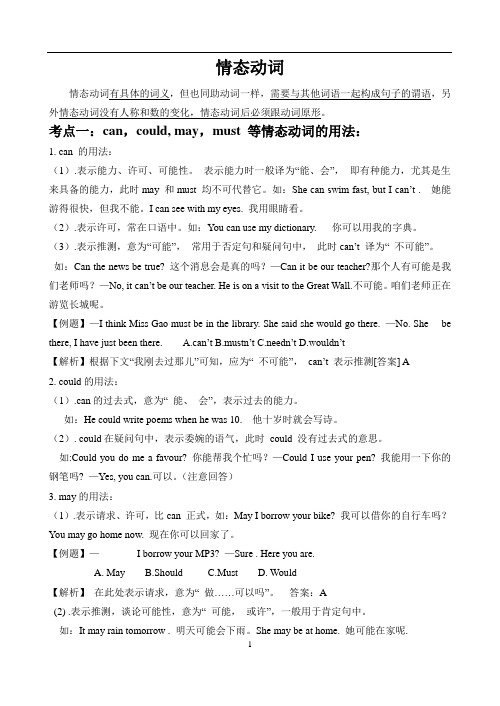
情态动词情态动词有具体的词义,但也同助动词一样,需要与其他词语一起构成句子的谓语,另外情态动词没有人称和数的变化,情态动词后必须跟动词原形。
考点一:can,could, may,must 等情态动词的用法:1. can 的用法:(1).表示能力、许可、可能性。
表示能力时一般译为“能、会”,即有种能力,尤其是生来具备的能力,此时may 和must 均不可代替它。
如:She can swim fast, but I can’t . 她能游得很快,但我不能。
I can see with my eyes. 我用眼睛看。
(2).表示许可,常在口语中。
如:You can use my dictionary. 你可以用我的字典。
(3).表示推测,意为“可能”,常用于否定句和疑问句中,此时can’t 译为“ 不可能”。
如:Can the news be true? 这个消息会是真的吗?—Can it be our teacher?那个人有可能是我们老师吗?—No, it can’t be our teacher. He is on a visit to the Great Wall.不可能。
咱们老师正在游览长城呢。
【例题】—I think Miss Gao must be in the library. She said she would go there. —No. She __be there, I have just been there. A.can’t B.mustn’t C.needn’t D.wouldn’t【解析】根据下文“我刚去过那儿”可知,应为“ 不可能”,can’t 表示推测[答案] A2. could的用法:(1).can的过去式,意为“ 能、会”,表示过去的能力。
如:He could write poems when he was 10. 他十岁时就会写诗。
(2). could在疑问句中,表示委婉的语气,此时could 没有过去式的意思。
8.情态动词与虚拟语气汇总

1. (1) You may go home now.
(2) — May I borrow your towel? — Yes,you may./No, you can't(mustn't). 1. (1)你现在可以回家。 (2) ——我可以借用你的毛巾吗?
—— 是的,你可以。 / 不行,你不可以。 / 不, 你决不能借用我的毛巾。
2. Will you help me with my work?
在我工作方面帮助我好吗?
5
3. Every morning he will have a walk along this river. 每天早上他都会沿着河流散步。 4. If you will read this article,you will realize you are wrong. 假如你愿意看这篇文章,你就会认识到你错了
5
will 的主要用法有: 1.表示意志、意愿;
2.在疑问句中用于第二人称,表示请求或询问 对方的意思;
3.表示习惯、经常性、倾向性,有“惯于、总 是”等意义; 4.在if,when,until等连词引导的表示时间
5
或条件的从句中要用一般时表将来,但在 if 从句中 有时为了表示意愿也可用will,有“愿意”的意思。
中国南方的一些城市冬天里可能会很冷的。
3
can的主要用法有: 1. 表能力,翻译为“能够/会”。
2. 表可能性,翻译为“可能/会”。
3. 表许可,翻译为“可以”,用于否定句,表示 不允许,翻译为“不可以/不能”。 4. 表示偶然发生的可能性,翻译为“有时会”。 5. 用于否定句,表推测,翻译为“不可能”。
祝你成功。
5. (1)You may well say so.
常见的情态动词有

常见的情态动词有情态动词是英语中重要的词类之一,它们强调了说话者对某种态度、情感或推测的表达。
在英语中,一共有十种情态动词,它们分别是 can、could、may、might、shall、should、will、would、must 和 ought to。
下面将分别介绍这十种情态动词的基本用法和常见表达方式。
1. cancan 是情态动词中最常用的一种,用于表示“能力”、“许可”或“可能性”等含义。
例如:- I can speak Chinese fluently.(我说中文说得很流利。
)- Can I borrow your pen for a moment?(我能否借一下你的笔?)- It can be difficult to understand Shakespeare.(理解莎士比亚可能会很困难。
)can 的否定形式是can’t,表示“不能”或“不可能”。
例如:- I can’t run very fast.(我跑不太快。
)- This can’t be true.(这不可能是真的。
)2. couldcould 是 can 的过去式,也可以表示“能力”、“许可”或“可能性”。
它比 can 更委婉,常用于礼貌性的请求、建议或询问。
例如:- Could you please pass me the salt?(你能把盐递给我吗?)- I think we could try to finish this project by next week.(我想我们下周会试着完成这个项目。
)- It could rain later, so take an umbrella just in case.(天气可能会下雨,所以带把伞以防万一。
)could 的否定形式是couldn’t,表示“不能”或“不可能”。
例如:- I couldn’t understand what he was saying.(我听不懂他在说什么。
情态动词知识汇总

情态动词名师导航1.系动词be, look, smell, get, become, turn, keep等的基本用法。
2.情态动词can, may, must, need, shall, will等的基本句型结构及主要用法。
考点梳理考点一情态动词情态动词表示说话人对某一动作或状态的态度,表示“可能”、“应当”、“必要”等含义,但其本身词义不完全,不能独立作谓语,必须和动词原形连用。
情态动词没有人称和数的变化。
其否定形式一般是在情态动词后加not (have to除外),其疑问形式是将情态动词提至主语前。
情态动词数量不多,但用途广泛,主要有:can/could, may/might, must, need, shall/should, will/would。
1.can和could的用法(1)can/could 表示“能力;许可;可能性”等。
could 为can 的过去式。
如:Can I use your bike?我可以用你的自行车吗?(2)can 用在疑问句中,表示征求意见、请求许可,答语仍用can; could 用在疑问句中,比can 更委婉、客气,是一种礼貌的说法,并不表示过去时态,答语用can,而不能用could。
如:—Could you tell me the way to the zoo?你能告诉我去动物园的路吗?—Sorry. I can't. I'm new here.不好意思,我不知道。
我是新来的。
[注意] can 和could 只能用于现在时和过去时两种时态,将来时中用be able to。
另外,can't 可表示否定推测。
如:That ______ be Mr. Wang. He has gone to Beijing.那肯定不是王老师,他已经去北京了。
2.may和might的用法may/might 意为“可以”,表示同意、许可或请求对方许可,也可表示祝愿。
(完整版)情态动词大全

(完整版)情态动词大全一、选择题1.—Where is Tom? I am considering ________ him about the result of the exam.—Oh. You ________. He has known it already.A.to tell; can't B.telling; needn't C.tell; mustn't D.told; shouldn't 2.Don’t cross the road until the traffic lights turn green. A car_______hit you.A.need B.may C.should D.must 3.—Hurry up, Jack! Let’s cross the road as fast as possible.—No, you ________. Don’t you see the light is still red?A.couldn’t B.wouldn’t C.mustn’t D.needn’t 4.—There is a knock at the door.—It ________ be my mom. She always comes back home at this time.A.may B.may not C.must D.can’t5.Our Chemistry teacher always tells us we ________ be too hardworking before the exams. A.mustn’t B.shouldn’t C.needn’t D.can’t6.— ________ you give me a hand? I can’t put up the poster by myself.—No problem.A.Could B.Should C.Need D.Must7.— Is Lang Lang going to perform at Art Center this Friday?— Yes. It ________ be him. He has been here for three days.A.might B.must C.mustn’t D.may 8.Exercise is helpful but it ________ be regular (规律的) exercise.A.must B.may C.can D.need 9.—How do you like my new dress?—Well, if I ________ say, it is not suitable for you.A.may B.must C.have to D.should 10.You'd better __________ hard from now on, __________ you will fail the exam. A.work; and B.working; or C.working; and D.work; or 11.—I must go to school today, ________?—No, you ________.You can go as soon as you get well.A.mustn’t I;needn’t B.needn’t I;needn’tC.mustn’t I;mustn’t D.needn’t I;mustn’t12.If you buy your mum an iRobot floor cleaner, she ________ sweep the floor every day. A.can’t B.mustn’t C.needn’t D.shouldn’t 13.---Will you be back early this evening?---Yes, but I ________ be a little late. Our boss sometimes has extra work for us.A.may B.must C.need D.will14.You ______ pay too much attention to your pronunciation, as it is so important in the oral (口头的) test.A.shouldn’t B.mustn’t C.can’t D.needn’t15.—Shall we go camping this summer holiday?—Nothing________be better.A.should B.could C.must D.may 16.—Would you please________in that way? That’s not safe!—Sorry. I won’t do it any more.A.not driving B.not to drive C.no driving D.not drive 17.—Ready? Let’s get started, Martin.— Swimming? I just ________ get used to it in winter.A.can’t B.needn’t C.mustn’t D.shouldn’t 18.Dr. Zhong Nanshan once said, "To prevent the spread of this disease, we________never be too careful."A.can B.may C.must D.should19.—Will your mother be at home this Saturday?—Hard to say. She _______go to the countryside to see my grandparents.A.must B.may C.can D.would20.You ________ write the report again because spelling mistakes are not allowed at all. A.must B.can C.may D.could21.You’ve got an A in the maths test again. You ________ be good at it.A.can B.may C.must D.should 22.According to the rule, used batteries ________ be dropped in the red bin for harmful wastes. A.may B.would C.should D.might23.Never throw objects from the building. Even a small object ________ cause serious injuries, or death, when dropped from a great height.A.must B.should C.may D.need24.Most young people like shopping online because they ________ spend much time going from shop to shop.A.needn’t B.can’t C.mustn’t D.shouldn’t 25.You ________ pay too much attention to protecting yourself if you plan to go abroad. A.mustn’t B.can’t C.shouldn’t D.needn’t 26.—Shall I tell him the change of the time right now?—I’m afraid you ________, otherwise he will be late for the meeting.A.can B.may C.must D.need 27.—Seventy dollars for such a dress! You ________ be joking!—I’m serious. It’s made of silk from Hangzhou.A.must B.need C.will D.can28.—Must we stop the Japanese government discharging nuclear waste water (排放核污水) into the Pacific Ocean?—________. Because everyone should protect our earth and it is bad ________ us to eat the polluted seafood and drink the waste water.A.Yes, we can; of B.No, we mustn’t; of C.Yes, we must; for D.No, we needn’t; for 29.—Why didn’t you tell it to me earlier?— Why ________ I? I want to have my own secret.A.can B.may C.should D.shall30.Cars ________ give way to walkers on some roads in Binhai, or the drivers will be fined. A.may B.will C.can D.must31.A hard-working man ________ become a great scientist, but a great scientist ________ be a hard-working man.A.can’t; can B.may not; must C.can’t; must D.may not; can 32.Mr. Black ________ be at home now. He went abroad on vacation last Friday.A.can’t B.mustn’t C.needn’t D.shouldn’t 33.—Could you tell me how to renew the library books?—With pleasure. You ________ come t o our desk every time. It’s easier to renew them online. A.can’t B.mustn’t C.needn’t D.shouldn’t 34.—The article says that a person’s animal sign decides his personality.—You ________ read it for fun, but don’t believe in that.A.can B.must C.shouldn’t D.needn’t 35.— What do you think of the show yesterday?— Some of them were really good but others ________ be better.A.will B.must C.need D.can36.—I don’t care what people think.—Well, you _______ . Some opinions are worth weighing.A.should B.might C.could D.would37.—I think they are enough. We ________ make so many chairs.—I don’t think so. Because nearly a quarter of them need ________.A.don’t need to; mending B.needed; to be mendedC.don’t need; mend D.need; to mend38.You ________ be careful with the camera. It costs!A.can B.will C.should D.may39.—Is it really necessary for me to go shopping with a mask on?—I’m afraid you ________ in public. It is not only to protect yourself but also to protect others. A.must B.should C.can D.need40.Look at the floor, Tom! ________ you watch TV while having a meal?A.Should B.Could C.Must D.May【参考答案】一、选择题1.B解析:B【详解】句意:——汤姆在哪里?我正在考虑告诉他考试的结果。
50个情态动词单词
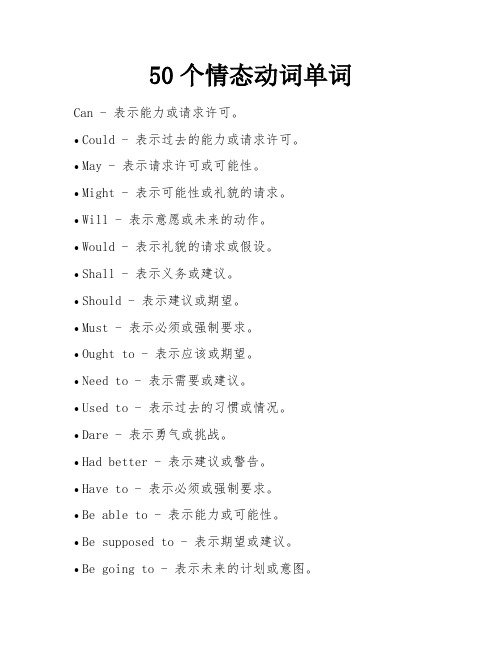
50个情态动词单词Can - 表示能力或请求许可。
•Could - 表示过去的能力或请求许可。
•May - 表示请求许可或可能性。
•Might - 表示可能性或礼貌的请求。
•Will - 表示意愿或未来的动作。
•Would - 表示礼貌的请求或假设。
•Shall - 表示义务或建议。
•Should - 表示建议或期望。
•Must - 表示必须或强制要求。
•Ought to - 表示应该或期望。
•Need to - 表示需要或建议。
•Used to - 表示过去的习惯或情况。
•Dare - 表示勇气或挑战。
•Had better - 表示建议或警告。
•Have to - 表示必须或强制要求。
•Be able to - 表示能力或可能性。
•Be supposed to - 表示期望或建议。
•Be going to - 表示未来的计划或意图。
•Be willing to - 表示愿意或心甘情愿。
•Be likely to - 表示可能性或预测。
•Be sure to - 表示确定或建议。
•Be afraid to - 表示害怕或不敢。
•Be accustomed to - 表示习惯或适应。
•Be obliged to - 表示义务或强制要求。
•Be allowed to - 表示许可或允许。
•Be forbidden to - 表示禁止或不允许。
•Be used to - 表示习惯或适应。
•Would rather - 表示宁愿或选择。
•Would like - 表示愿望或请求。
•Would love to - 表示喜欢或渴望。
•Could have - 表示过去的可能性或错过的机会。
•Might have - 表示过去的可能性或未实现的期望。
•Should have - 表示过去的建议或期望。
•Must have - 表示过去的必须或推测。
•Needn't have - 表示过去本不必要或多余的事情。
英语语法知识点汇总情态动词
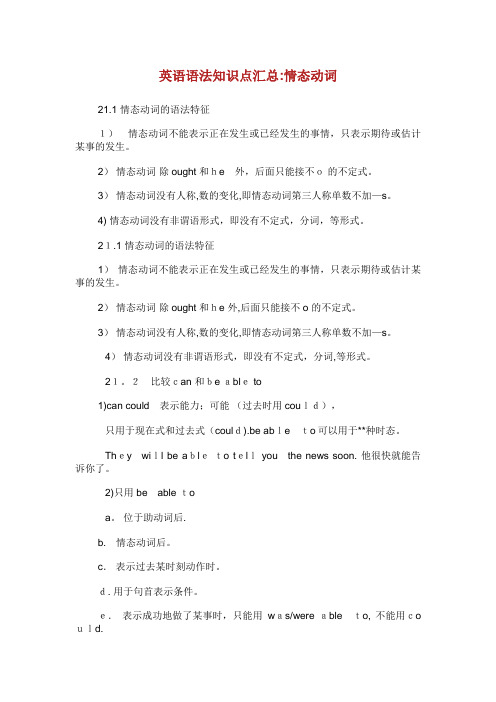
英语语法知识点汇总:情态动词21.1 情态动词的语法特征1)情态动词不能表示正在发生或已经发生的事情,只表示期待或估计某事的发生。
2)情态动词除ought 和he外,后面只能接不o的不定式。
3)情态动词没有人称,数的变化,即情态动词第三人称单数不加—s。
4) 情态动词没有非谓语形式,即没有不定式,分词,等形式。
21.1 情态动词的语法特征1)情态动词不能表示正在发生或已经发生的事情,只表示期待或估计某事的发生。
2)情态动词除ought 和he 外,后面只能接不o 的不定式。
3)情态动词没有人称,数的变化,即情态动词第三人称单数不加—s。
4)情态动词没有非谓语形式,即没有不定式,分词,等形式。
21。
2比较can 和be able to1)can could表示能力;可能(过去时用could),只用于现在式和过去式(could).be ableto可以用于**种时态。
They will be ableto tell you the news soon. 他很快就能告诉你了。
2)只用be able toa。
位于助动词后.b.情态动词后。
c.表示过去某时刻动作时。
d. 用于句首表示条件。
e.表示成功地做了某事时,只能用was/were ableto, 不能用co uld.He was able to flee Europe before the war broke out.= He managed tofleeEurope before the warbroke out.注意:could不表示时态1)提出委婉的请求,(注意在回答中不可用could)。
-—— Could I hethe television on---Yes,you can./ No, you can t.2)在否定,疑问句中表示推测或怀疑。
He couldn t bea bad man.他不大可能是坏人.21。
3 比较may和might1)表示允许或请求;表示没有把握的推测;may 放在句首,表示祝愿。
